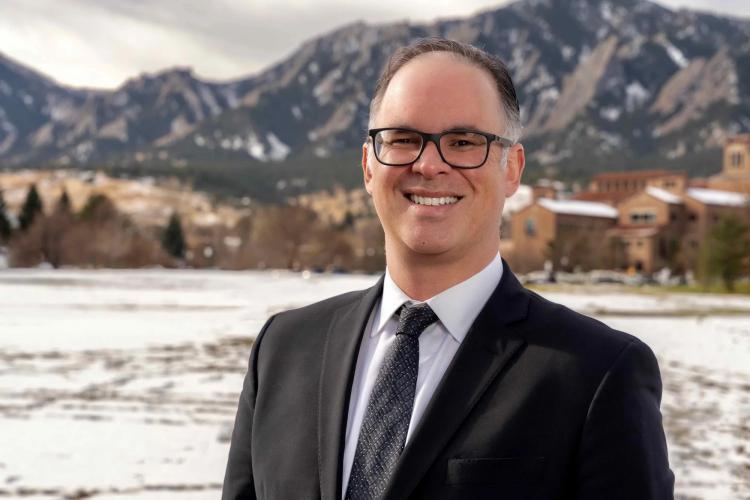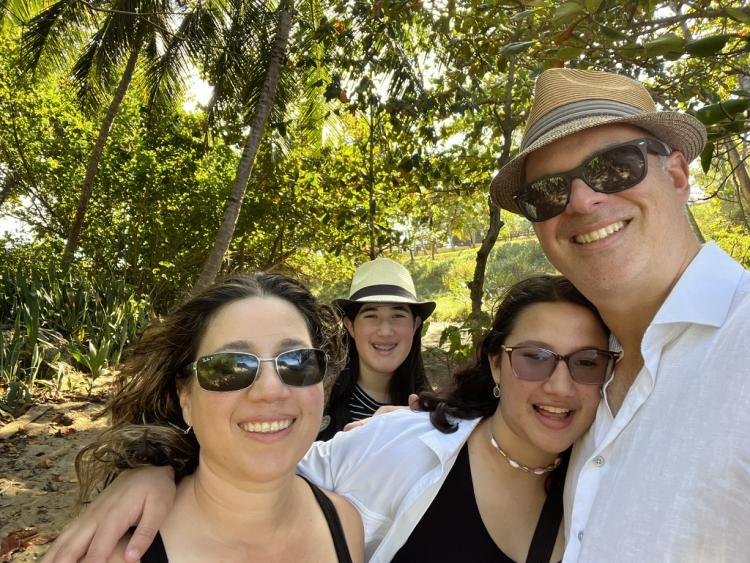 Fernando Rosario-Ortiz has always appreciated the teachers and mentors who have led him down his twisting journey to academia. Now, that journey has landed him in the role of interim dean of the CU Boulder School of Education after, once again, colleagues pointed him toward the role.
Fernando Rosario-Ortiz has always appreciated the teachers and mentors who have led him down his twisting journey to academia. Now, that journey has landed him in the role of interim dean of the CU Boulder School of Education after, once again, colleagues pointed him toward the role.
A series of mentors nudged Rosario-Ortiz toward chemistry, then environmental engineering, and eventually, academia. He is passionate about university teaching and research, and he has enjoyed leadership roles exploring complex issues in higher education.
Provost Russell Moore named Rosario-Ortiz as the interim dean in November 2023, and the dean appointment began Jan. 1. Dean Rosario-Ortiz’s chief priority over his 18-month tenure is preparing the school and its practices, policies, and budget for the next dean following a national search. Rosario-Ortiz’s multidimensional administrative positions and his respect for the School of Education’s nationally recognized scholarship have positioned him to make a difference.
Learn more about Rosario-Ortiz, what led him to this role, his goals, and how he spends his time when he is, finally, off the clock in this Q&A.
Tell us a little more about you and your passions?
I am a very straightforward person. I love what I do, and I love research and teaching. I appreciate the mission of the university as an educator and researcher. Colorado is a great place to do research and we have great people here. The administrative side of my work is new. This is my fourth leadership opportunity in seven years. I like the aspect of serving the community. Those are some of the things that drive me and why I come here everyday.
Why the School of Education, right? When I was first approached about the opportunity to serve the education community, I was very excited with the prospect of supporting the community. I knew many of the people at our school, and I was quite conscious of the talent that’s here, the ways we support students, and the school’s outstanding national reputation. It seemed like a good opportunity for me to bring my energy, enthusiasm, positivity and optimism and to try to build a bridge to the next phase of the school’s trajectory.
You are passionate about CU Boulder and your faculty role, but what initially led you to university teaching and research?
I come from a small town in Puerto Rico. As most kids from rural areas, you may not have a lot of examples of professional careers around you. A lot of my family members are teachers. I always thought ‘How cool?’ You get to teach and educate people, and more importantly, you get to open minds, hearts and lives to opportunities. I always thought that was interesting.
My first inclination in college was to become a doctor, as I had limited exposure to other professions such as engineering. I was so unsure about what the world had to offer that I essentially listened to a professor who told me to change my major to chemistry, so I did.
Then made it to California for graduate school in chemistry, and then on to the Environmental Science and Engineering Program at UCLA. As part of this program, I ended up working in a drinking water treatment facility in Las Vegas, where I began to be interested in the field of environmental engineering. Then I joined CU Boulder in 2008, as professor of environmental engineering. I always wanted to teach. I never thought I had the skill to teach at the primary or secondary level, so I gravitated toward college level. Teaching is important to me. I'm sad that I don't get to do it right now, but I'll come back to it.
What was it about teaching that lured you into higher education?
I'm here because of teachers and professors. I think there's a lot of me that is essentially paying it forward. I would not be here without some really good mentoring and the opportunity to attend these institutions and continue forward. I didn't grow up in a setting where I became an engineer because half my family are engineers. I always appreciate how education creates opportunities and how it opens people up to different things. I wanted to do some of that.
To this day, a lot of what I’ve been thinking around the equity lens is essentially how talent is equally distributed and opportunities are not. How do we make sure that we look for the best talent, bring those talented people to our community, and offer them the tools to grow? Ultimately we're better because of it.
You sort of “fell into” chemistry, then environmental engineering, and now various leadership roles. Walk us through those roles and what you have learned from them?
In 2016, after I returned from sabbatical, I started to get this itch, “what else?” I'd been working very hard on building my own skill set and my research, and I was ready to explore everything else this university has to offer. There was an opportunity for me to be involved in the accreditation of my program, and I took it thinking “let’s just see how this feels.” Accreditation, I am fairly certain, is a very intense process in just about every discipline. It was a lot of work and stressful, but at the end, once we successfully went through it, I remember thinking “oh that was kind of fun.” I liked that it allowed me to take a close look at our program and see how we're better serving the students and the community as a whole. I like that organizational aspect, and I like complex problems around education.
My next step was associate director for the Environmental Engineering program, essentially running the graduate part. Then I became a director of my program, where I had all kinds of plans about maximizing the impact, creating opportunities for collaboration, and creating big initiatives. Then within six months, COVID-19 happened, so a lot of the exciting things I wanted to do got put on hold. At that time the priorities shifted to “how do we take care of each other, how do we take care of our students, and how do we continue?” It was a difficult situation for me, like everyone else. It was also very rewarding to work through that and to try to be there for people. We did a lot of things to improve the situation.
I was looking forward to going back to all the great plans I had for Environmental Engineering, but I was approached about the faculty advancement associate dean position for the College of Engineering and Applied Science. There, my focus was on processes and the support structure the faculty needed to succeed. We worked on improvements to faculty search processes, and we revised our processes for reappointment, promotion, and tenure. We worked with six units and the college to rewrite everything we did, and we started developing updated processes for teaching faculty. Within two years, I was approached about this role in the School of Education, so now I'm here.
It sounds like you make things happen as a leader. What drew you to the dean role and the School of Education?
I knew some of the people here, and I knew that a lot of good things were happening here. Like others, I was a spectator to some of the changes happening in the school. I found out I was suggested (as an interim dean candidate) by people in different settings. Even if I had a few reservations initially, I think that there's a vote of confidence from the people who suggested me. I have worked on a number of campus initiatives, like Academic Futures and for BFA Academic Affairs, so I knew a lot of the faculty in the school.
When I was approached, it took me like 20 minutes to realize that I wanted to do it. I was excited for a lot of reasons. I knew enough of the people here, and to some extent, I thought I could make a difference by supporting the great work happening here and working through leadership transitions together.
What are your priorities as dean?
Overall, I am mindful that there are certain decisions that the next permanent dean should make. My top priority is to transition the school to this next person. As much as I think we should do some deep thinking about where we’re going—and I include myself in that—I think the process of updating our strategic vision should fall on the next person.
Having said that, we cannot sit around for the next 17 months. I'm hoping to tackle opportunities that are universal—meaning good things that are going to be welcomed by the next person. What can we do around that? We can continue to work on the budget. We can have some considerations about growth and how we handle growth. We can further invest in research and research opportunities. We can think about how to potentially reorganize certain aspects of the overall operation knowing that ultimately all of those things will be useful to the permanent dean and for the here and now. Overall, I am very excited to be leading this school.
What do you look forward to learning from education students, faculty, staff, and alumni?
I know that the school is impactful, and I would like to have a much better idea of how impactful it is. I know that there are challenges in education— bilingual education when it comes to the arrivals of migrants, economic differences in education attainment, recovery after COVID-19, for example. How do we use AI for new educational enterprises? How do we support the state in economic development by providing support to the school districts? How do we support marginalized communities internationally? There’s a lot to look forward to.
For the folks who don’t know you yet, tell us about your non-work passions. What does a "perfect" Saturday off the clock look like?
I would start with a nice long walk whether that's just walking around the neighborhood or a hike with my wife followed by a nice breakfast. Then probably another type of physical activity in the afternoon like a bicycle ride or another hike, followed by a nice meal. And throw in some music in the middle. (Editor’s note: his choice of music is hard rock!)
Is there anything else you want us to know?
I am excited to be here, and I appreciate the warm reception from faculty, students and staff. I am looking forward to getting to know more students, alumni, supporters and partners of the School of Education, and I hope you all know I am open to your ideas and suggestions.
Rock on, and welcome, Dean Fernando Rosario-Ortiz!

